Black Voters For Trump: Why Immigration, Economy Policies Won Over Conservative African Americans
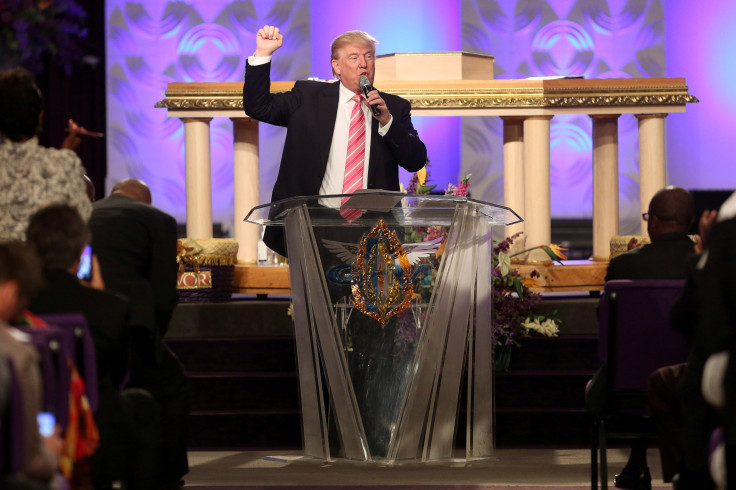
Black Entertainment Television (BET) founder Bob Johnson urged his fellow African Americans Monday to give President-elect Donald Trump "the benefit of the doubt" after having a "great chat" with him about "business solutions to social problems" the day before. During a Thursday night show in San Jose, California, Kanye West, whose rap lyrics often deal with race issues in America, told an audience he didn’t vote on Nov. 8, but if he did, he “would have voted for Trump.”
With Trump’s racial remarks frequently making headlines and black voters choosing Hillary Clinton by a margin of 80 percent on Election Day, the idea of African Americans supporting the real estate magnate may come as a surprise to some. Trump’s success, after all, was widely seen as a repudiation of progress made by the nation’s first black president. But Johnson and West aren’t alone in their affinity for the president-elect.
Kanye West: I didn't vote but if I did, 'I would have voted for Trump' https://t.co/wtDpAj3Cw7 pic.twitter.com/2JDvJPBE7u
— CNN (@CNN) November 18, 2016
Trump ultimately won a larger share of the black vote than Republican contender Mitt Romney did when running against President Barack Obama in 2012, with 8 percent compared to Romney’s 6 percent, according to NBC News exit polls. His support from black voters came despite Trump’s habit of linking African Americans to inner-city crime and poverty in campaign speeches.
“No group in America has been more harmed by Hillary Clinton’s policies than African Americans—no group, no group,” Trump told a predominantly white crowd in Dimondale, Michigan, in August. “What do you have to lose? You’re living in poverty, your schools are no good, you have no jobs, 58 percent of your youth is unemployed. What the hell do you have to lose?”
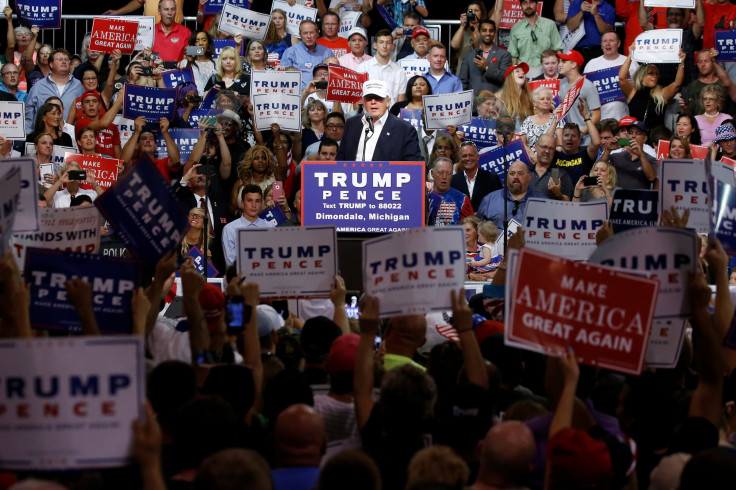
In interviews with International Business Times, conservative black voters across the U.S. pointed to the sluggish economic recovery and immigration-friendly policies under the Obama administration as a driver in their support for Trump. In a Charlotte, North Carolina speech in October that directly addressed the African-American community, he pledged to keep urban manufacturing jobs in the U.S., enact childcare tax deductions for working class families and beef up city law enforcement. Trump has also tied the Black Lives Matter movement to police killings and pledged to expand stop-and-frisk programs commonly seen as discriminatory.
North Carolina businessman and black conservative activist Johms Gool was initially leaning toward Ben Carson, the only African American 2016 GOP primary candidate, but didn't feel that the conservative neurosurgeon "had the charisma" needed for a general election win. But whoever ended up winning the Republican nomination, Gool was ready to abandon the policy goals of the party currently in charge of the executive branch.
“There’s been a disillusionment with the Democratic Party [among blacks], that President Obama and Hillary Clinton are not the answer,” Gool said in a phone interview, calling Obama a “president of Wall Street” and Trump a “president of Main Street.”
“If Donald Trump delivers what he promised, he will flip the black vote. If he does not, he’ll lose the 8 percent he got,” he said.
While the total U.S. unemployment rate has fallen from its 2009 peak of 9.3 percent to below 5 percent this year, the unemployment rate for African Americans has remained at or nearly twice that of the rest of the country, according to yearly Bureau of Labor Statistics data. The labor participation rate, which has fallen for the general population over the course of Obama’s presidency, has remained one to three percentage points lower for African Americans compared to the national rate over the same period.
For many black Republican voters, frustration with Obama's economic recovery was exacerbated by a centerpiece issue of the Trump campaign: border security and immigration.
Trump has proposed construction of a “big, beautiful wall” to keep out undocumented immigrants, as well as mass deportations to expel those who are already working in the U.S. without documentation. He told an audience in Phoenix at the end of August that Clinton was promising “uncontrolled, low-skilled immigration that continues to reduce jobs and wages for American workers, and especially for African-American and Hispanic workers within our country, our citizens.”
College educated blacks—who likely make more money than their non-college-educated counterparts and therefore aren't competing against undocumented immigrants for jobs, were more likely to vote for Trump, the Washington Post's exit polls found.
But Gool, the CEO of a Charlotte, North Carolina-based information technology company, insisted on the issue's importance to black Republican voters.
“It makes it impossible for unskilled laborers who are born here legally if there are illegal ones taking all the low-paying jobs,” he said.
In Ohio, the state's Black Republicans Association Vice President Jeff Green—who embraced Trump early on in the GOP primary, though his political organization exhibited only "mixed" support—said he saw Obama’s policies as damaging to African Americans. He specifically named the Affordable Care Act, which, despite covering millions of Americans who previously could not afford insurance, has put financial pressure on middle class families who earn too much to qualify for subsidies but face premiums that are still on the rise. For the African-American demographic, the median income of which is nearly $20,000 below the national average, the effects of higher premiums may be disproportionately severe.
“The recovery for the African-American community has been almost nil—they wiped out the black middle class with the ACA bill,” Green said of the health care law.
Drawn to Trump's business background, Green, whose band The Sensations played at the Republican National Convention in July, waved off questions regarding the 1973 federal lawsuit against Trump, his father and Trump Management for alleged discrimination against African-American renters. He blamed the racism of lower-level employees at the real estate company, not Trump himself.
Green said he was more concerned with the president-elect’s promises to bring jobs back to rust-belt centers like Detroit. Green, an Ohio native, hopes greater employment opportunities will be more beneficial to African Americans than any of Obama’s policies.
“You never hear the Democrats talk about economic development in the black community—never,” he said. Democrats, Green added, push for equal outcomes, but “America is a place of equal opportunity.”
Green’s colleague, James Ervin, who serves as president of the Ohio Black Republicans Association, was originally a supporter of Ohio Gov. John Kasich, but stuck with Trump after the billionaire secured the GOP nomination in the hope that the Republican nominee would bring “positive and productive” initiatives to Washington, in contrast to Obama’s policies, which he said didn’t help the black community. Trump’s pledges to limit U.S. trade with the outside world, he said, were most promising.
“I do think that his policies of restructuring trade around the world are helpful to getting us on the right track,” Ervin said. “I think if there is a broad economic agenda that allows us to create more jobs, then in that respect, a rising tide lifts all boats.”
In California, Kenneth Douglas, a loyal supporter of the far-right tea party movement and a Pasadena native, said he didn’t believe in welfare programs or the objectives of the Democratic Party. Douglas, 58, decided after doing a bit of research in the days before Nov. 8 to vote for the Republican candidate.
“I find that a lot of people in the black community want to be victims—I think people want to use this as an excuse,” Douglas, who is between jobs and has long voted Republican, said in a phone interview with IBTimes. “I just think America is shifting away from its core values, the old ‘pull yourself up by the bootstraps’ mindset. We live in a culture of lazy people.”
Black conservative commentator and Washington D.C.-based businessman Antonio Merrick praised Trump's rhetoric on the campaign trail as a sort of dog-whistle for the exact demographic group the Republican nominee need to capture, and ultimately did: rural, white Americans. Trump has said he has "a great relationship with the blacks," that he prefers Jewish men to "black guys counting my money" and defended accusations of racism by pointing to his decision to select a black contestant as the winner of his reality show, "The Apprentice." He also started the so-called "birther movement," an effort to push Obama to prove that he had been born in the U.S. that was widely reviled as blatantly racist.
“I do believe he stirred the pot a bit—it was smart, from the birther thing to… everything,” Merrick told IBTimes. “There is not a racist bone in his body.”
A managing director at a digital marketing and consulting firm, Merrick said he'd grown up admiring the billionaire, but supported GOP primary candidate Jeb Bush, then candidate Marco Rubio before finally settling on Trump. A father of two girls, he stuck with the president-elect even after leaked audio surfaced in which Trump bragged about his ability to sexually assault women.
But more importantly to Merrick, the president-elect stood as a viable alternative to a candidate whose party was accepting of LGBT people, which runs counter to his religious beliefs, Christian values he believes are shared by much of the black community.
"That 'Access Hollywood' video really stunned me," he said, referring to the leaked audio in which Trump claimed to be able to do whatever he wanted to women, thanks to his celebrity status. "But there is one fundamental element: It is religion. The Democrats have forced upon African Americans, who are very religious, that homosexuality is being considered normal."
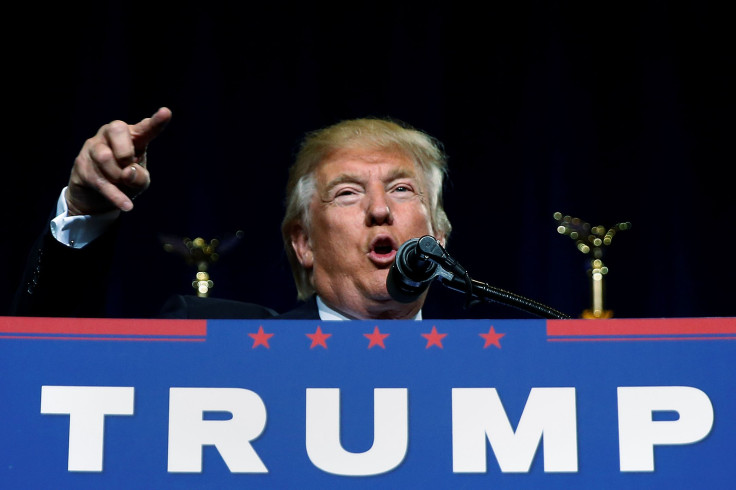
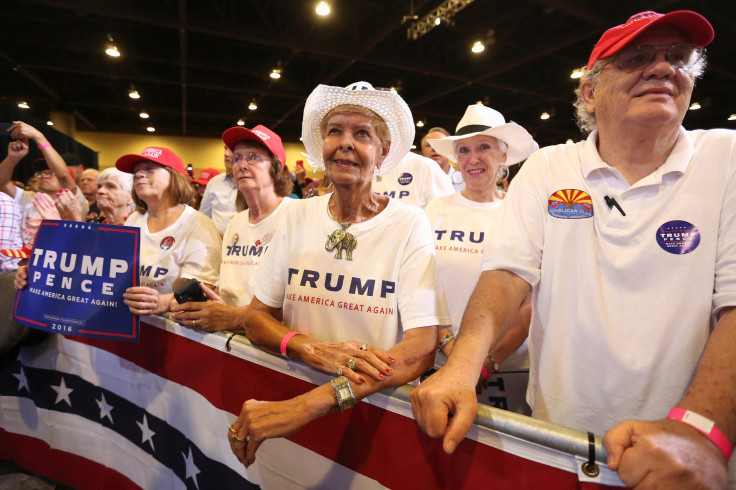
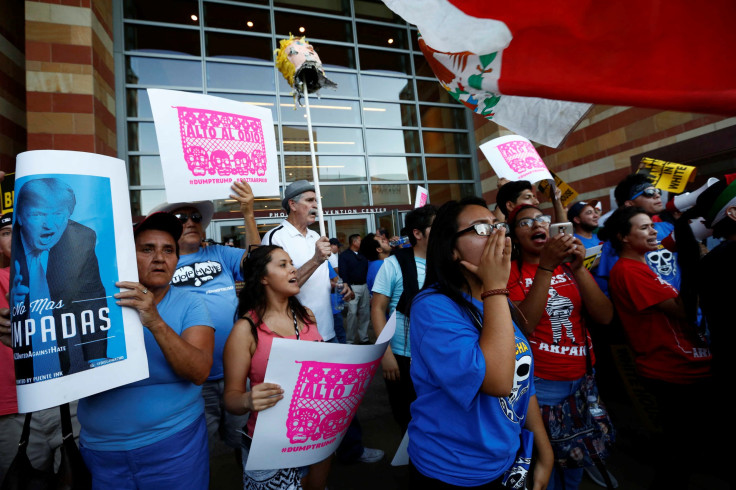
Leo Smith, an African-American voter in Georgia who directs minority engagement for the state's GOP, said Clinton’s campaign exploited the Black Lives Matter social justice movement movement for political capital, whereas Trump has pushed for policies that could elevate the black lower and middle classes.
Smith added that he "defaulted" to Trump as "the best candidate for black people" this presidential election for largely economic reasons. When the economy and education in the U.S. aren’t performing at their best, he argued, historically disadvantaged groups like African Americans fare the worst.
“Voting for Trump is a vote for opportunity,” said Smith, the founder and CEO of a Roswell, a Georgia-based nonprofit. “Trump presents his ideas that he’s going to fight for these things.”
To Smith, Obama's executive actions on immigration, which allow people brought to the U.S. illegally at a young age to delay their deportation and legally participate in the U.S. economy, represented an attack on the economic struggles of the black community. He characterized First Lady Michelle Obama’s famous Democratic National Convention speech, which spotlighted progress made by black Americans, as far from praiseworthy, given her husband’s immigration policies.
“When Michelle Obama says, ‘I wake up in a house built by slaves and see my daughters out playing on the White House lawn,’ and they’re trying to let in all these illegal immigrants," he said, "I think that’s extremely hypocritical."
© Copyright IBTimes 2025. All rights reserved.






















